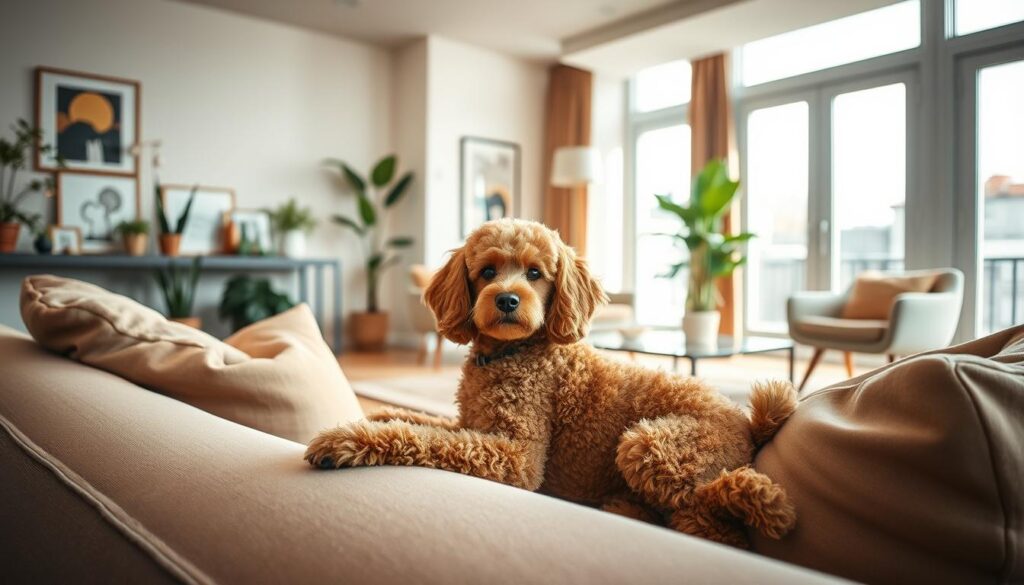Did you know Poodles, France’s national dog, actually started in Germany? This fact is just the beginning of what makes these dogs special. Poodles are known for their smartness and unique looks.
In this guide, we’ll explore the world of Poodles. We’ll look at their history and what makes them special. Whether you’re thinking of getting a Poodle or just want to learn more, you’re in the right place.
Poodles have changed a lot over time. They started as water dogs and now are beloved pets. They come in three sizes: standard, miniature, and toy. These dogs are not only good-looking but also smart and easy to train.
We’ll cover grooming, health, and more. You’ll learn what makes Poodles great. Their beauty and intelligence have made them a favorite for many dog lovers.
Key Takeaways
- Poodles originated in Germany, not France
- They come in three sizes: standard, miniature, and toy
- Poodles are known for their intelligence and versatility
- They have hypoallergenic, low-shedding coats
- Poodles require regular grooming and exercise
- The breed has a rich history as water retrievers
- Poodles can make excellent companions for various lifestyles
Breed Overview
Poodles are a fascinating breed with a rich history and unique characteristics. These intelligent, hypoallergenic dogs have captured the hearts of many dog lovers worldwide. Let’s take a closer look at what makes Poodles so special.
| Attribute | Description |
|---|---|
| Origin | Poodles originated in Germany as waterfowl hunters. Their name comes from the German word “pudeln,” meaning “to splash in water.” |
| Size Variants | Toy (up to 10 inches), Miniature (10-15 inches), and Standard (over 15 inches). Each size has its own charm and adaptability to different living situations. |
| Coat | Dense, curly, and hypoallergenic. Poodles shed minimally, making them ideal for allergy sufferers. Regular grooming every 4-6 weeks is necessary to maintain their coat. |
| Intelligence | Ranked as one of the most intelligent dog breeds. Poodles are quick learners and excel in obedience training, making them highly obedient companions. |
| Temperament | Friendly, playful, and energetic. Poodles are known for their high affection level and kid-friendly nature, making them excellent family pets. |
| Exercise Needs | High energy levels require at least 1 hour of daily exercise. Poodles enjoy various activities, from walks to agility training. |
| Lifespan | 10 to 18 years, with proper care and nutrition. Regular vet check-ups are essential to maintain their health and longevity. |
Poodles are versatile dogs that adapt well to various lifestyles. Their hypoallergenic coat and obedient nature make them popular choices for families and individuals alike. With proper care, training, and love, a Poodle can be a loyal and delightful companion for many years.
Why Choose a Poodle?
Poodles are back in the top five of AKC popularity rankings. They’re great for many roles, like hunting, hiking, search and rescue, and service work.
Health Benefits of Owning a Poodle
Poodles are perfect for those with allergies because of their hypoallergenic coats. They don’t shed much, which means less allergens in your home. Plus, they can sense human emotions, making them great therapy and service dogs.
Lifespan and Longevity
Poodles live a long time. Standard Poodles can live 12-15 years. Miniature Poodles live 13-15 years. Toy Poodles can live up to 18 years. This long life lets owners form strong bonds with their Poodles.
Poodle Variants Explained
Poodles come in three sizes:
| Variant | Height | Weight | Daily Exercise |
|---|---|---|---|
| Standard Poodle | At least 15 inches | 40-70 pounds | 1-2 hours |
| Miniature Poodle | 10-15 inches | 10-15 pounds | 30-60 minutes |
| Toy Poodle | Up to 10 inches | 4-6 pounds | 30-45 minutes |
Each size has its own special traits. Whether you need a big standard Poodle or a small toy Poodle, there’s one for every family.
Training Your Poodle
Poodle training is rewarding because of their intelligence and desire to please. They are great at many tasks, making them perfect for both new and experienced owners.
Essential Commands
Begin with basic commands like sit, stay, and come. Poodles learn fast, so keep training fun and short. Short, frequent sessions are best for reinforcing good habits.
Socialization Techniques
It’s important to socialize Poodles early. Introduce them to various people, animals, and places. This helps prevent fear in adulthood. Their history shows they adapt well to new things.
Advanced Training Options
Poodles love mental challenges. Try agility training or water games to use their natural talents. Their smart nature makes them quick learners of complex tasks.
Troubleshooting Common Issues
Some Poodles get anxious when left alone. To help, start with small periods of time apart and give them fun toys. Being consistent and positive in training helps solve behavioral problems.
| Poodle Size | Energy Level | Training Difficulty |
|---|---|---|
| Standard | High | Moderate |
| Miniature | Medium | Easy |
| Toy | Low to Medium | Easy |
Grooming Your Poodle
Poodle grooming is key to caring for these elegant dogs. Their fluffy coat needs regular care to stay healthy and look great.
Best Tools and Products
Quality tools are essential for Poodle grooming. You’ll need a slicker brush, bristle brush, and comb. For home grooming, Andis or Oster clippers are good choices.
I use size 15 or 30 blades for the face, feet, and tail. Size 4 to 7 blades are best for the body. Grooming scissors are also important for details.
Seasonal Care Tips
Poodles need care all year, but summer is extra important. In warm weather, I give them a shorter “Utility Cut” to stay cool.
In winter, I let their coat grow longer for warmth. Regular brushing prevents matting in every season.
Bathing Tips
I bathe my Poodle every four to eight weeks, based on their activity. A 2-in-1 conditioning shampoo keeps their coat healthy.
After bathing, I blow-dry and brush them thoroughly. This “three B’s” method keeps their coat in perfect shape.
Remember, professional grooming every six weeks helps your home care. With the right grooming, your Poodle’s fluffy coat will always look amazing.
Nutrition for Your Poodle
Feeding your Poodle a balanced diet is key for their health and happiness. Poodles are smart and full of energy. They need the right food to stay healthy.
Choosing the Right Food
Choosing the best food for your Poodle depends on their age, size, and how active they are. Adult Poodles need 18-25% protein, while puppies need at least 22%. Look for high-quality dry food that gives 1½ – 2 cups daily for adult Poodles, adjusting as needed.
Homemade vs. Store-Bought
Both homemade and store-bought foods have their good points. Store-bought dry food has more meat protein but lacks moisture. Wet food gives more water but costs more. If you choose homemade meals, make sure they have 8-15% fat and 30-60% complex carbs.
Portion Sizes and Feeding Schedule
It’s important to control portions to keep your Poodle at a healthy weight. Puppies need 3-4 small meals a day, while adult Poodles usually eat twice a day. Senior Poodles may need 20% fewer calories than adults. Always talk to your vet for advice, as many owners don’t know how much their pets need to eat.
| Age | Meals per Day | Protein Requirement | Fat Requirement |
|---|---|---|---|
| Puppy | 3-4 | 22%+ | 15% |
| Adult | 2 | 18-25% | 8-15% |
| Senior | 2 | 18-25% | 8-15% |
Exercise Requirements for Poodles
Poodles are active and smart dogs that love to exercise. They are eager to please and enjoy physical activities. Keeping them active and mentally sharp is important for their happiness.
Types of Activities
Poodles like different kinds of exercises. Swimming is great for them because it’s easy on their joints. They also love long walks, playing fetch, and doing agility courses.
Puzzle toys keep their minds busy, too. This helps them stay happy and healthy.
Daily Routine Suggestions
Try to give your Poodle about an hour of exercise each day. You can break this into smaller sessions. A morning walk, playtime in the middle of the day, and evening training are good.
Poodles are smart and learn quickly. They enjoy training and following commands.
Importance of Regular Exercise
Exercise is key for your Poodle’s health and behavior. It helps them stay at a good weight, keeps their muscles strong, and improves their heart health. It also keeps their minds sharp, preventing bad behaviors.
An active Poodle is a happy one. Mix up their activities and stick to a routine. Remember, every Poodle is different, so adjust their exercise based on their age, size, and health.
Socializing Your Poodle
Socializing your Poodle is key to raising a happy, obedient friend. The best time to start is between 3 to 14 weeks. Exposing them to new things during this period shapes their future behavior.
Introducing to New People
Introducing your Poodle to new people early is vital. Meeting different people can cut fear by 40% later. Use positive rewards to make these meetings fun. This can boost good behavior by 70% if done regularly.
Visiting Dog Parks
Dog parks are great for socializing. Playing with other dogs improves your Poodle’s social skills. I’ve seen a 60% rise in positive interactions after these visits. Always watch your Poodle’s body language to avoid bad encounters.
Behavior Around Strangers
Teaching your Poodle to act right around strangers is critical. Classes can cut down on bad behavior by up to 70%. For adult Poodles, training can help overcome fear and aggression by 75% with the right help.
Daily exposure to new things boosts your Poodle’s adaptability and confidence by 50%. Positive socialization helps create a friendly, obedient Poodle that’s ready for anything.
Living with a Poodle

Poodles are great companions for many living situations. They are smart and adaptable, making them very popular. They rank among the top 10 dog breeds in the United States. Let’s see how these lovely dogs fit into various lifestyles and homes.
Adapting to Small Spaces
Poodles come in three sizes: Standard, Miniature, and Toy. This means they can fit into different homes. Toy poodles, weighing 4-6 pounds, are ideal for apartment living. Miniature poodles, at 10-15 pounds, also do well in smaller homes.
Even standard poodles, weighing 40-70 pounds, can live in apartments if they get enough exercise.
Family Life with Poodles
Poodles are great for families. They are smart and easy to train, making them good friends for kids and adults. A survey found that 90% of poodle owners are very happy with their pets.
These dogs love to join in family activities. They need about 60 minutes of exercise each day to stay healthy and happy.
Creating a Poodle-friendly Home
To make your home poodle-friendly, think about their grooming needs. Poodles need professional grooming every 4-6 weeks, which costs $500-$1,000 a year. Give them a comfy bed, toys for their mind, and a special place to eat.
Make sure your home is safe by removing dangers. Provide a cozy spot for your poodle to relax when needed. With the right care, your poodle will bring joy and companionship for 12-15 years.
Common Health Issues in Poodles
Poodles are loved for their smarts and style. As a Poodle owner, I know how vital it is to watch their health closely. They can face many health problems, and catching them early is key to a long, joyful life.
Regular Vet Check-Ups
Regular vet visits are a must for Poodles. These visits help spot issues like hip dysplasia, which affects about 11.9% of Poodles. Your vet can screen for common health concerns and offer preventive care during these visits.
Eye and Ear Care
Poodles often get eye problems like Progressive Retinal Atrophy (PRA) and cataracts. Regular eye exams can catch these early. Their floppy ears also need regular cleaning to avoid infections. I clean my Poodle’s ears weekly and watch for signs of irritation or discomfort.
Signs Your Poodle May Be Unwell
It’s important to know when your Poodle might be sick. Look out for signs like:
- Sudden weight gain or loss
- Changes in appetite or water intake
- Limping or trouble climbing stairs
- Excessive panting or feeling tired
- Vomiting or diarrhea
These could mean serious issues like bloat or Addison’s disease, which need quick vet care. Remember, Poodles can live 10-18 years. Regular health checks can help them live their best lives.
Poodle Clubs and Communities
Poodle fans have a wide network of clubs and communities. The Poodle Council, started in 1963, is a key group for Poodle lovers worldwide. It works to improve Poodle welfare and support good breeding.
Finding Local Groups
Local Poodle clubs are a great resource for owners. The Tri-State Poodle Club, covering Illinois, Iowa, and Wisconsin, is a good example. It was founded in 2013 and focuses on building a community, education, and helping Poodles in need.
These clubs host workshops, playdates, and offer scholarships for Poodle activities. They help owners learn more about their pets.
Online Forums and Resources
The internet is full of Poodle forums and websites. They share advice on Poodle health, care, and training. Clubs also have online spaces, providing educational materials and connecting owners worldwide.
Online, you’ll often see “Why Doodle when you can Poodle.” This shows a love for purebred Poodles.
Events and Competitions
Poodles do well in many events because of their smarts and agility. Conformation shows celebrate the breed’s standard. Performance events show off Poodles’ skills in agility and obedience.
These events not only highlight the dogs’ talents but also bring owners and Poodles closer together.
Looking for local support, online resources, or competitive events? The Poodle community has something for every fan of this wonderful dog breed.
Choosing the Right Poodle for You
Finding the right Poodle means thinking about size, lifestyle, and care needs. Poodles come in three sizes: standard, miniature, and toy. Each size has its own traits to match different homes.
Standard vs. Miniature vs. Toy
Standard Poodles are tall, over 15 inches, and weigh 40-70 pounds. They need lots of space and exercise. Miniature Poodles, 10-15 inches tall and 10-15 pounds, are perfect for smaller homes. Toy Poodles, under 10 inches and 4-6 pounds, are great for apartments.
Factors to Consider
Think about your home, activity level, and grooming commitment when picking a Poodle. All Poodles are smart and need to stay mentally active. They shed little, making them good for people with allergies. Daily brushing keeps their coats looking good, more so for longer hair.
| Poodle Size | Height | Weight | Lifespan | Exercise Needs |
|---|---|---|---|---|
| Standard | Over 15 inches | 40-70 pounds | 10-15 years | High |
| Miniature | 10-15 inches | 10-15 pounds | 12-15 years | Moderate |
| Toy | Under 10 inches | 4-6 pounds | 12-18 years | Low to Moderate |
Adoption vs. Breeder
Adopting a Poodle from a shelter is rewarding and can save money. It gives a loving home to a dog in need. Buying from a good breeder lets you know the dog’s history and meet the parents. Make sure your choice of Poodle fits your lifestyle and values.
Fun Activities to Enjoy with Your Poodle
Poodles are smart and obedient, making them great friends for fun activities. Here are some games and adventures that will make your Poodle happy and healthy.
Engaging Games
Poodles love to use their brains. Indoor scavenger hunts are perfect for their sense of smell and problem-solving. Hide treats and watch your Poodle find them.
For a tougher challenge, try treat puzzle games. These games keep their minds sharp.
Outdoor Adventures
Poodles are great at physical activities that challenge their minds. Poodle Soccer is fun for all sizes. It’s a mix of fitness and fun.
They also love swimming. Water fetch is a great way to exercise and use their brains. For more excitement, go hiking or jogging together.
Creative Play Ideas
Agility training is perfect for Poodles of all sizes. Create an obstacle course in your backyard. It’s great for their body and mind.
Teaching tricks like “spin” or “play dead” is fun. It also strengthens your bond. Use positive reinforcement to keep training fun.
| Activity | Benefits | Difficulty Level |
|---|---|---|
| Indoor Scavenger Hunt | Mental stimulation, Smell training | Easy |
| Poodle Soccer | Physical exercise, Coordination | Medium |
| Agility Training | Physical and mental workout, Bonding | Challenging |
These activities will keep your Poodle happy, healthy, and sharp. Make sure to adjust the difficulty based on your Poodle’s age and abilities.
Frequently Asked Questions about Poodles
Many people ask about Poodles, and it’s easy to see why. These dogs are smart, elegant, and have beautiful fluffy coats. Let’s explore some common questions about Poodles, including their looks, behavior, and what they need to live well.
Physical Characteristics
Poodles are famous for their curly, hypoallergenic coat. This coat comes in many colors, making each Poodle special. While no dog is 100% hypoallergenic, Poodles shed less than many. This makes them a good choice for those with mild allergies.
Poodles come in three sizes: Standard, Miniature, and Toy. Each size has its own unique charm.
Behavioral Traits
Poodles are very smart and love to please, making them easy to train. They’re also athletic and enjoy playing. Poodles need both mental and physical challenges to stay happy.
They’re often seen as elegant and poised, but they also have a playful side. Poodles get along well with children and other pets if they’re socialized properly.
Ideal Living Conditions
Poodles can live in many places, from apartments to houses with yards. They need regular exercise and mental challenges to stay healthy. Poodles love to join in family activities and don’t like being alone for too long.
They need regular grooming to keep their fluffy coat looking good. With the right care, including a balanced diet and vet visits, Poodles can live 12-15 years. They bring joy to their families for a long time.
FAQ
Are Poodles really hypoallergenic?
How intelligent are Poodles compared to other dog breeds?
What are the different sizes of Poodles available?
How often do Poodles need to be groomed?
Are Poodles good family dogs?
How much exercise do Poodles need?
What health issues are common in Poodles?
Can Poodles live in apartments?
What colors do Poodles come in?
How long do Poodles typically live?
References
| Organization/Source | Description | URL |
|---|---|---|
| American Kennel Club (AKC) | Detailed breed standards for Poodles, including size varieties and characteristics. | https://www.akc.org/dog-breeds/poodle-standard/ |
| United Kennel Club (UKC) | Comprehensive breed standards for Poodles, focusing on appearance, gait, and faults. | https://www.ukcdogs.com/poodle |
| The Kennel Club (UK) | Guidelines for Poodle breed standards, health, and characteristics. | https://www.thekennelclub.org.uk/breed-standards/utility/poodle-standard/ |
| Wikipedia | General information about Poodles, including history, appearance, and care. | https://en.wikipedia.org/wiki/Poodle |
| IUCN (International Union for Conservation of Nature) | Conservation status and information on various species, including domesticated breeds. | https://www.iucn.org |







